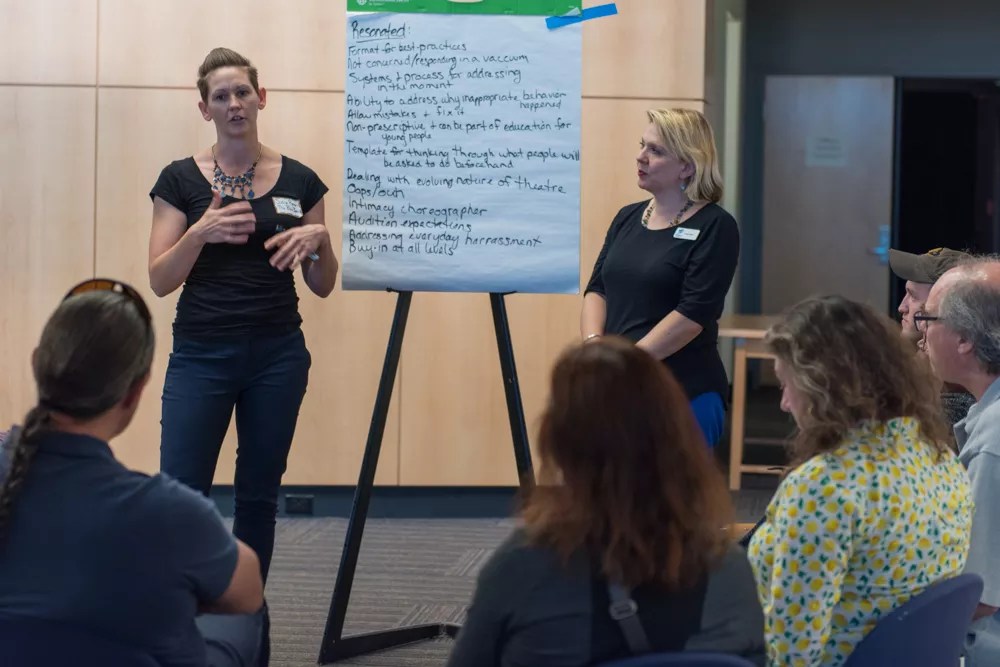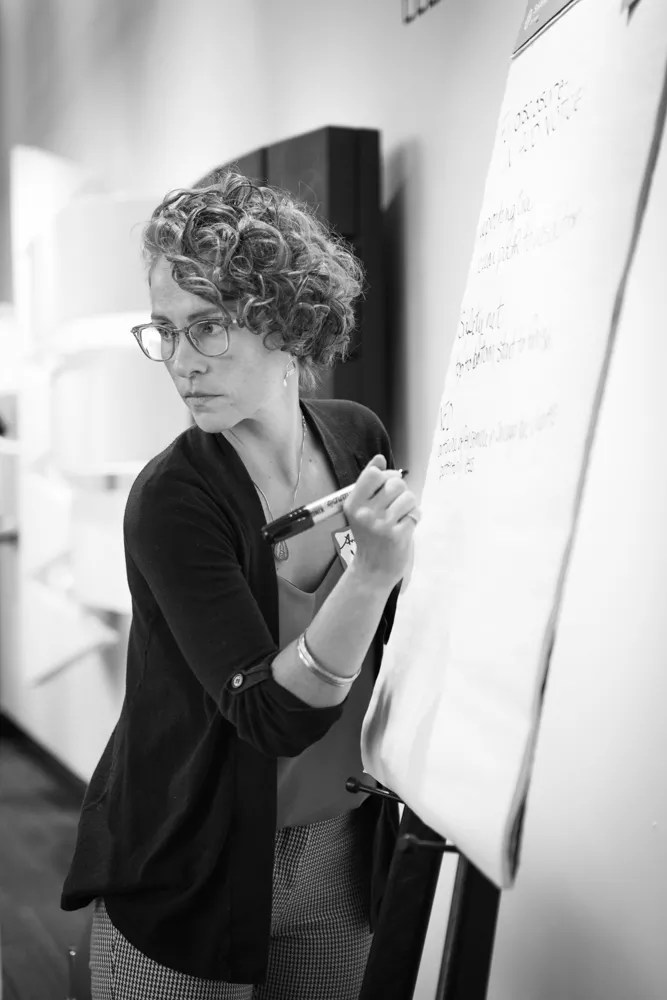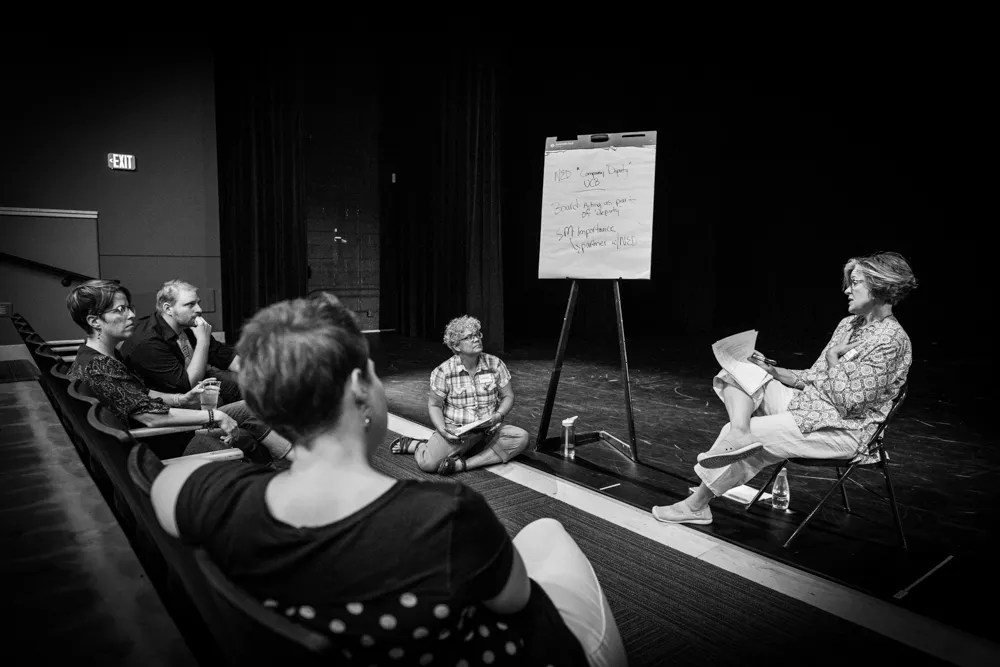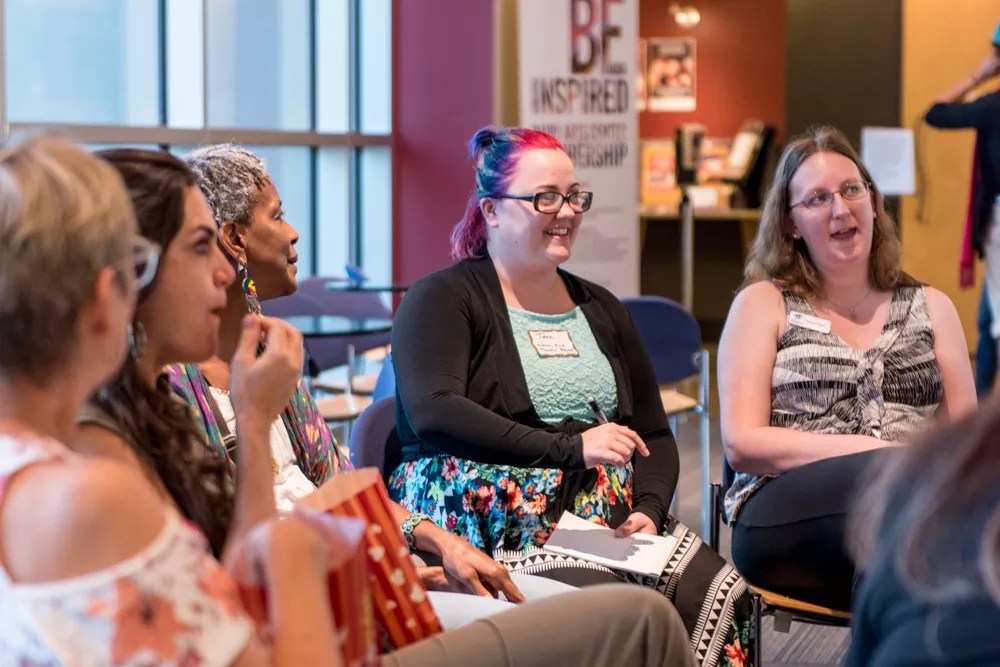
Rick Villarreal

Audio By Carbonatix
Even as most theaters are shut down by COVID-19, the Front Range theater community continues to wrangle with how to address sexual harassment, safety, accessibility and inclusivity.
This work isn’t new.
Two years ago, some women in the theater community organized Not in Our House: Boulder Theatre Community in Conversation to talk about common measures every Colorado theater should implement to achieve a safe environment for actors and crew. The policies discussed mirrored the Not in Our House rules established for Chicago theaters.
From there, the conversation went on for over a year. The group came up with a working document, Colorado Theatre Standards – guidelines for reporting sexual harassment, maintaining safe dressing rooms, boundaries during auditions, and even how to handle violence, stage intimacy and nudity in performances.
The Colorado Theatre Standards were developed by the co-founders of the Rocky Mountain Artists’ Safety Alliance, an association promoting safe spaces and practices, including Amanda Rose Villarreal, a Ph.D. student and graduate part-time instructor at the University of Colorado Boulder’s theater and dance department; Tammy Meneghini, an associate professor for the CU Boulder theater and dance department; and Angela Astle, the founder and executive producer of the Athena Project, a nonprofit empowering women through the arts.
The Rocky Mountain Artists Safety Alliance also partners with other key players in Colorado theater such as the Colorado Theatre Guild, Phamaly Theatre Company, the Stage Managers’ Association, and the Dairy Arts Center.

Amanda Rose Villarreal taking notes at Not in Our House: Boulder Theatre Community in Conversation.
Rick Villarreal
“Young theater artists are somehow taught, without anyone directly saying it, that the key to success in theater is being easy to work with,” Villarreal explains. “Combine that with the first rule of improv – ‘Always say yes, and…’ – and we learn early on to stop standing up for ourselves.”
Villarreal and Meneghini set out to teach their students how to stand up for themselves in the industry and to spread the document they created.
“We are still not out to police production entities; we can’t do that. We don’t have the legal recourse, the time, the resources or the desire to do that.” Villarreal says. “But we are spreading the document. It’s available to any producing entity that wants a copy. We actively seek feedback to improve the document, because we know that people can only do better when they know better, and we don’t know everything. We want to learn so that we can do better, too.
“We’ve also begun a new process of assisting theaters in implementing the document,” Villarreal continues, “attending first rehearsals and meeting with stage managers and directors to clarify when needed.”
The conversations about safety are continuing to evolve with the times.
Between the global COVID-19 pandemic and high-profile murders of Ahmaud Arbery, George Floyd, Breonna Taylor, Elijah McClain and other Black people and the riots and protests that ensued, in 2020, the stakes for these discussions have been raised.
Such events inspired Lisa Young, a local actor, activist, boardmember of the Colorado Theatre Guild and stroke survivor, to formulate an organization of her own called IDEAs. The group champions inclusion, diversity, equity, and access to answer the question: What are we prepared to do to dismantle racism, anti-Blackness, and inequalities in theater and keep us safe from discriminatory practices?
“As a Black woman living with hidden disabilities, I had found some success in working with mainstream companies and Phamaly Theatre Company,” Young says. “But I rarely saw my brothers and sisters on stages outside of Phamaly. I also performed with ImaginASL, formerly Rocky Mountain Deaf Theatre. I saw the lack of opportunity in casting for deaf and blind actors, those with neurodiversity and mobility issues.
“After sitting at home in semi-isolation because of moderate asthma, I created a plan,” Young continues. “Unlike George Floyd, I was breathing and could be a greater part of the movement by demanding change, taking actionable steps, and holding the community as a whole accountable for this work in policy change and decision making.”
Young says IDEAs is a woman-led association that aims to make a permanent positive impact in the industry by demanding that theaters be more inclusive and mindful while generating routes for diverse programming and casting. The IDEAs team includes BIPOC and Caucasian women who identify as lesbian and queer, non-binary, heterosexual and cis-gender and are bold enough to focus on the sameness of others instead of their differences.
“IDEAs was a dream I had over several years,” Young says. “Like Langston Hughes’s poem said, it was a dream deferred, and it exploded. I wanted a women-led organization that operated from a non-patriarchal stance. We have more work to be done, but we are doing it by listening and leading with trust, intuition, passion and vision.”

An active listening circle at Not in Our House: Boulder Theatre Community in Conversation.
Rick Villarreal
To address the events of 2020, Rocky Mountain ASA is hosting Zoom listening sessions called Safer in Theater on August 15 and 16, inviting IDEAs, Phamaly, CTC and SMA to discuss theater-safety measures about sexual harassment, COVID-19 and the BIPOC and disabled communities’ struggles amid the global pandemic.
“It’s hard to make changes when people are already on a roll – when momentum and ‘That’s the way we’ve always done it’ will continue propelling people forward in an unchanged path,” Villarreal says. “But the pause allows a unique opportunity for us to take a breath in and make a different choice. It provides time for people to get used to the idea of implementing a change…to really reflect on their past practices and then more purposefully plan how to reopen.”

Women actively listening at Not in Our House: Boulder Theatre Community in Conversation at the Dairy Arts Center in August 2018.
Rick Villarreal
Young explains that she wanted to participate in the Safer in Theater sessions to keep artists, patrons and community members safe from racism, sexism, ableism, elitism, trans- and queer-phobic stereotypes and other phobias and -isms. She also wants to combat the acts of white-washing, Black-, brown-, yellow- and red-facing, wrong gender casting on non-binary and trans actors, and other issues that make the theater industry challenging and uncomfortable for marginalized participants.
“If we keep perpetuating racist and stereotypical tropes, we only set ourselves up for increased harm and dehumanization of marginalized and underrepresented people,” Young says. “I am the perfect example of the intersectionality of being Black, being a person with a disability, and being an artist. So, if my Black life [and] story doesn’t matter on stage, then it can never matter on the streets.”
“We’re not experts in all sorts of inclusive practices,” Villarreal says. “So we have reached out to those in the area who are better equipped to tackle specific topics.”
Young stands firm in Oscar Wilde’s quote: “Life imitates art far more than art imitates life.” She wants to share this with all who will listen at these sessions.
She wants people to “be good to one another. Make space for differing voices without bias and tone policing, understand white-power structures and privileges that had led theater astray from its intent to create engaging stories which tell a well-rounded humanistic point of view. Theater and society are so closely linked. Oscar Wilde’s quote could be a reality if we are willing to share resources, access and opportunity with reckless abandon!”
Rocky Mountain ASA’s free “Safer in Theater” sessions will occur via Zoom meetings Saturday, August 15, and Sunday, August 16.